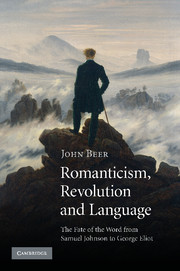Book contents
- Frontmatter
- Contents
- Preface and acknowledgments
- List of abbreviations
- 1 ‘Democracy’ in Somerset and beyond
- 2 Politics, sensibility and the quest for adequacy of language
- 3 The heart of Lyrical Ballads
- 4 The Prelude: a poem in process
- 5 Words or images? Blake's representation of history
- 6 Blake, Coleridge and ‘The Riddle of the World’
- 7 Challenges from the non-verbal and return to the Word
- 8 The Nature of Hazlitt's taste
- 9 Jane Austen's progress
- 10 Languages of memory and passion: Tennyson, Gaskell and the Brontës
- 11 George Eliot and the future of language
- Index
7 - Challenges from the non-verbal and return to the Word
Published online by Cambridge University Press: 04 August 2010
- Frontmatter
- Contents
- Preface and acknowledgments
- List of abbreviations
- 1 ‘Democracy’ in Somerset and beyond
- 2 Politics, sensibility and the quest for adequacy of language
- 3 The heart of Lyrical Ballads
- 4 The Prelude: a poem in process
- 5 Words or images? Blake's representation of history
- 6 Blake, Coleridge and ‘The Riddle of the World’
- 7 Challenges from the non-verbal and return to the Word
- 8 The Nature of Hazlitt's taste
- 9 Jane Austen's progress
- 10 Languages of memory and passion: Tennyson, Gaskell and the Brontës
- 11 George Eliot and the future of language
- Index
Summary
Wordsworth might absorb himself in the mysteries of the human heart, but by 1799 Coleridge's insight into the nature of genius was leading him further: for him now the whole universe was more mysterious than it might have seemed in the middle of the eighteenth century. After his return from Germany, he was increasingly interested in the work of Humphry Davy, with whom he had become acquainted in Bristol, and – through their common friendship – of Thomas Beddoes at the Pneumatic Institution there. When Davy moved to London and the Royal Institution, Coleridge kept in touch, following some of his experiments eagerly: Davy's reports on his experiments with nitrous oxide actually included statements from Coleridge himself.
At his first inhalation, Coleridge reported, he had experienced ‘a highly pleasurable sensation of warmth over my whole frame, resembling that which I remember once to have experienced after returning from a walk in the snow into a warm room’. A further experiment of the kind was still more spectacular in its effects:
I could not avoid, nor indeed felt any wish to avoid, beating the ground with my feet; and after the mouthpiece was removed, I remained for a few seconds motionless, in great extasy.
On Boxing Day 1799, Davy experimented on himself, reporting similar pleasurable sensations – and indeed his loss of all connection with external things and illusion of making discoveries – until,
with the most intense belief and prophetic manner, I exclaimed to Dr Kinglake, ‘Nothing exists but thoughts! – the universe is composed of impressions, ideas, pleasures and pains!’
- Type
- Chapter
- Information
- Romanticism, Revolution and LanguageThe Fate of the Word from Samuel Johnson to George Eliot, pp. 113 - 131Publisher: Cambridge University PressPrint publication year: 2009



